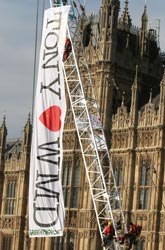Here's what Tony Blair has to say in his book 'A Journey' on the 2007 decision to replace the Trident nuclear weapon system:
"We agreed to the renewal of the independent nuclear deterrent. You might think I would have been certain of that decision, but I hesitated over it. I could see clearly the force of the common sense and practical argument against Trident, yet in the final analysis I thought giving it up too big a downgrading of our status as a nation, and in an uncertain world, too big a risk for our defence. I did not think this was a 'tough on defence' versus 'weak or pacifist' issue at all. On simple, pragmatic grounds there was a case either way. The expense is huge, and the utility in a post-Cold War world is less in terms of deterrence, and non-existent in terms of military use. Spend the money on more helicopters, airlift, and anti-terror equipment? Not a daft notion. In the situations in which British forces would most likely to be called upon to fight, it was pretty clear what mattered most. It is true that it is frankly inconceivable we would use our nuclear deterrent alone, without the US – and let us hope a situation in which the US is even threatening use never arises – but it's a big step to put that beyond your capability as a country.
"So, after some genuine consideration and reconsideration, I opted to renew it. But the contrary decision would not have been stupid. I had a perfectly good and sensible discussion about it with Gordon, who was similarly torn. In the end, we both agreed, as I said to him: imagine standing up in the House of Commons and saying I've decided to scrap it. We're not going to say that, are we? In this instance caution, costly as it was, won the day"
So Tony Blair accepts that replacing Trident is hugely expensive, takes money away from more useful military equipment, and gives us a weapons system that could never be used. In the end the decision was all about how politicians perceive status – and being to timid to take a bold step that would show real global leadership.
